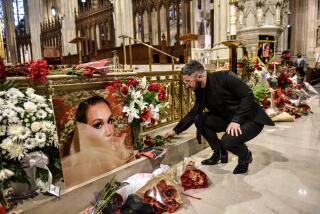Transsexual Nun’s Order Repudiated
As an 8-year-old boy in Pontiac, Mich., Michael Clark wanted to become a nun.
This week, Clark, who changed his name to Joanna after a sex change operation in 1975, took vows of poverty, chastity and obedience in a service officiated by an Episcopal priest in a San Clemente church.
Taking the name “Sister Mary Elizabeth,” Clark inaugurated her own order, the Community of St. Elizabeth.
But on Thursday, Acting Episcopal Bishop Oliver B. Garver Jr. repudiated the event.
“I do know and can say without any fear of contradiction that what has happened is neither the formation of a religious order or a religious community with any standing within the Episcopal Church,” Garver said.
And the priest who presided at the ceremony, the Rev. Robert Boyer, pastor of the St. Clement’s by-the-Sea Episcopal Church, conceded, “I really had not thought through the full implications of what I was doing.” Boyer officiated Wednesday when Clark, a U.S. Navy veteran and father of a 27-year-old son, took self-chosen vows and her new name.
Boyer said he blessed her habit, made by a friend from Butterick Pattern 3670, and silver cross to “affirm her desire to establish a religious community.”
Clark, 49, said Thursday that she will pursue her latest calling as a novice in her own order--even without the official blessing of the Episcopal Church. Clark said she had been sending unanswered letters to the diocese seeking official approval for her order since last fall.
But Los Angeles Bishop Garver, whose six-county diocese includes the San Clemente parish, said the matter was never referred to him. The Episcopal Church has several orders of nuns and brothers and canon law requires the approval of one or more bishops, Garver said.
“From what little checking we’ve been able to do, we haven’t been able to find any other bishop who can acknowledge having been in contact with this lady, or with the priest,” he said.
Archdeacon Terry Lynberg said he requested a written report from Boyer. At issue is not Clark’s gender status, but whether Boyer overstepped his authority as a parish priest in attempting to inaugurate a new monastic community in the Episcopal Church, he said.
In an interview Thursday, Clark said she had been active in the Baptist Church while she was a young man, but that after her sex-change surgery she sought admittance to six Roman Catholic and two Episcopal orders of nuns. All rejected her. While most gave no reason, she assumed it was because she is a transsexual, she said.
She joined the Episcopal Church two years ago and asked Boyer to sanction her vows.
Concern, Dedication
Boyer said that for a time he was concerned about her transsexuality, but after watching her concern and dedication for the needy, “I was willing to go forward and support her regardless of the consequences. I saw her love and faith in action.”
Garver said he had yet not spoken directly with Boyer and does not plan to until after the election for a new bishop, which scheduled to take place today.
Clark, who lives and works in a book-lined room in her parents’ mobile home in San Juan Capistrano, said she and two friends ordered materials on Episcopal rules and orders from England and drafted her own constitution for a new order and her own vows. She said her order is based on the Franciscans and will minister to the homeless and other “outcasts” of society.
‘No Exclusionary List’
“My feeling is that when Christ came to minister to us and died for us, his second commandment was to love our neighbors as ourselves. There was no exclusionary list attached to that,” she said.
Michael Clark spent 12 years in the U.S. Navy, reaching the rank of chief petty officer. Clark’s duties included training other Navy airmen in radar and sonar operations. Clark has a son she has not seen in 11 years, fathered in one of two marriages to women before the sex change.
Clark re-enlisted in the U.S. Army Reserves as a woman but was dishonorably discharged when the surgery was discovered. In 1982, she won $25,000 and an honorable discharge in a lawsuit settlement with the Army.
As Joanna Clark, she became an advocate for the gender-confused and once tried to adopt a transsexual state prison inmate she claimed was being held in the wrong prison. A judge denied her petition.
Times staff writer Mathis Chazanov also contributed to this story.
More to Read
Sign up for Essential California
The most important California stories and recommendations in your inbox every morning.
You may occasionally receive promotional content from the Los Angeles Times.










